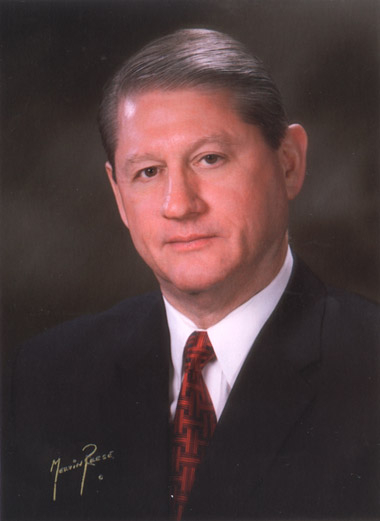Richard K. Davidson
Class of 2002
- Chairman (Retired) Union Pacific Corporation

There is no substitute for education. It presents opportunities that might not be there otherwise.
Dick Davidson was born in 1942 in rural Allen, Kansas. His father was a hardworking farmer who supplemented the family's income by doing soil conservation work for other local farmers using surplus earth-moving equipment from World War II. A coal stove heated the Davidson family's farmhouse, which for many years had no running water. Davidson's parents believed in the virtues and values of hard work, and as youngsters, Davidson and his brother were expected to help out with the never-ending chores of the farm.
Davidson contracted rheumatic fever when he was five, which delayed his starting school for a full year. In 1948, his father was killed in a car accident just a few miles from the farm. Davidson's mother, a registered nurse who had stayed home to raise her two sons, returned to work at a hospital 15 miles from the farm. To help with the bills, Davidson and his brother hired themselves out to other area farmers for 50 cents an hour. At the age of 14, Davidson traveled several hundred miles to western Kansas for a summer job on a farm. He sent every paycheck home to his mother.
Davidson describes himself as somewhat of a loner in his youth. "I think that came from not having a father," he says. "I was envious of the other boys who had a father, so I think that caused me to build a protective shell around myself." Although he missed his father's presence in his life, Davidson felt blessed to have his mother. "She was a terrific woman, and an even better mother," he says. "She was a conservative, hard worker who believed passionately in education."
Throughout high school, Davidson saved every dime he could as he worked for a local cattle rancher, but he still was not making enough money to pay for college, which was his ultimate goal. Following his high school graduation, Davidson made a decision that would change his life: He signed on as a part-time brakeman for the Missouri Pacific Railroad, launching what would become a lifelong career with the railroad.
During that summer with Missouri Pacific, Davidson's earnings, coupled with a partial basketball scholarship, were enough to get him started at Washburn University in Topeka, Kansas. While at Washburn, Davidson worked during the week as a night janitor in the state office building, but on weekends and holidays, he returned to work on the railroad. At one point, Davidson even took a semester off to work full time so that he could continue to pay his tuition.
After earning a degree in history, Davidson entered Missouri Pacific's management training program. In 1968, at age 26, Davidson became the railroad's youngest superintendent ever. He continued up the ladder to become assistant general manager in Kansas City. Following Missouri Pacific's 1982 merger with Union Pacific, Davidson became head of operations for the combined system. In 1991, after serving in several vice president positions, Davidson was elevated to president and CEO of Union Pacific Railroad. In 1997, he was named chairman, president, and CEO of Union Pacific Corp.
Looking back over his steady rise to the top of North America's largest transportation network, Davidson says, "My guiding philosophy is simple: Do your job to the best of your abilities. If you succeed, you'll get the chance to do even more." He also believes in asking lots of questions and not shying away from taking a few risks. Davidson says he tries to set an example of hard work and frugality, noting that "I would never ask someone to do something I wouldn't do myself."
Honored by his Horatio Alger Award, Davidson says that he especially likes the Association's mentoring aspects. "It is essential that adults take an active interest in young people," he says. "I want to help young people who need assistance receive the same opportunity for an education that I had. I admire and respect the Horatio Alger Association's work to help young people go to college who would not be able to go without assistance. It will make all the difference in the world to them. A college education opens the doors of opportunity, and I'm very pleased to be a part of that."
